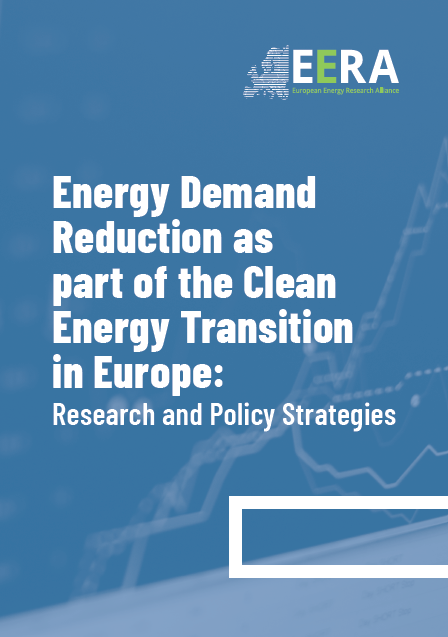
As Europe powers through the energy transition, climate mitigation and Strategic Autonomy objectives, our experts argue that a strong strategy for long-term demand reduction, encompassing all energy-consuming sectors (not only households), is critical.
EERA’s recently published report on energy demand reduction as part of Europe’s clean energy transition (CET) fills a lingering gap within the research community. Despite the clear prevalence of demand reduction as a key tool in transforming our energy systems and the economy as a whole, limited research and policy-orientated approaches exist on this topic.
Focus has predominantly centred on the technological, supply-side solutions to furthering the CET. However, even if renewable energy deployment has seen progressive scaling up, the share of renewables in the global energy mix has remained constant since 1990 due to a sustained growth in total energy consumption worldwide.
Although the EU shifted attention towards energy demand reduction policies when faced with the energy crisis stemming from the Russian invasion of Ukraine, these were short-term in nature. As such, this timely EERA report emphasises that, alongside the continued development of renewable energy technologies, there is a pressing need for a combined approach, one which encapsulates long-term energy demand reduction strategies in all energy-consuming sectors beyond households.
In all, this report provides a reliable analysis of the state of play of the collective knowledge base on energy demand reduction (IEA, IPCC, etc.) through the lenses of scientists from across Europe. Check out EERA’s key messages and policy recommendations below:
Key messages
EERA experts conclude that the most effective methods to reduce energy demand fuse a combination of three key demand reduction strategies, namely behavioural change, energy efficiency, and energy sufficiency.
Behavioural Change
Although behavioural change is imperative to demand reduction, a number of barriers, ranging from expectations of rational user behaviour, accessibility and affordability of energy-saving technologies, and cultural differences, are often overlooked when rules and incentives are designed for different user groups.
Comprehensive research on overcoming such barriers provides necessary solutions, complemented by the fact that both targeted information and awareness significantly enhance the engagement and impact of behavioural changes for all user types.
Energy Efficiency
Intrinsically linked to behavioural change is energy efficiency. Although currently the most prominent demand reduction strategy identified by policymakers, energy efficiency measures continue to suffer from a lack of investment in Europe, particularly in regard to the efficiency of industrial processes.
Although the importance of energy efficiency for demand reduction cannot be understated, such measures do not on their own ensure an absolute reduction of energy use. This is where EERA’s third interlinked proposal, energy sufficiency, comes into play.
Energy Sufficiency
Energy sufficiency seeks to guarantee a sufficient level of well-being throughout the process of reducing the absolute amount of resources used for producing energy services.
With highly transformative potential, energy sufficiency as a measure has the capacity to enable long-term behavioural change and energy savings through the transformation of infrastructure and the advancement of alternative methods of achieving comparable levels of comfort and services with minimal energy consumed.
EERA strongly asserts that in order to meet key EU targets of energy transition, climate mitigation, and strategic autonomy, clear long-term demand reduction strategies are essential. In addition, this expert analysis also argues that, if thoroughly planned, such strategies can be achieved without compromising levels of well-being and implemented based on the available knowledge and successful practices.
Policy Recommendations
The report concludes with a series of policy recommendations aimed at integrating energy demand reduction into the EU’s CET strategy by establishing specific reduction targets across all energy types and setting targets and indicators for energy demand reduction at EU and national levels. Moreover, it ultimately proposes integrating energy sufficiency by possibly elevating the “energy efficiency first” principle to “energy sufficiency first” and ensuring citizens actively shape energy demand-reduction measures by embodying the “citizen in the centre” principle.
Click here to read the full report.